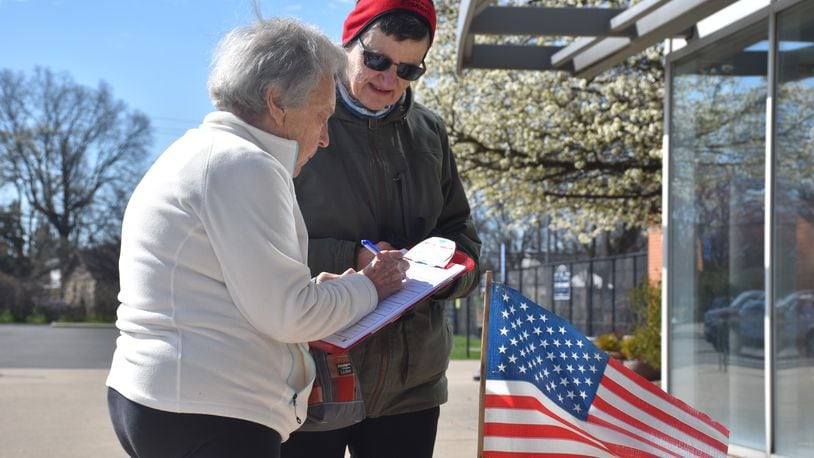Supporters say they are well on their way to collecting the more than 413,000 valid signatures they need by July 3 to qualify for the November general election ballot. The campaign declined to say how many signatures already have been gathered.
But hundreds of volunteers with Citizens Not Politicians fanned out to polling places across the state on Tuesday with hopes of adding thousands of signatures to the list.
The proposed constitutional amendment would create a 15-member Ohio Citizens Redistricting Commission that consists of five Republicans, five Democrats and five independents from various parts of the state.
Current or former politicians, political party officials and lobbyists would not be allowed to serve on the commission. The commission would be required to take part in an “open and independent process,” supporters say.
“We have citizens across Ohio gathering thousands of signatures every day and are on track to meet our goal,” said Chris Davey, a spokesperson for the Citizens Not Politicians campaign. “There is energy and enthusiasm from Republicans, Democrats and Independents, who all see that the system run by politicians is broken and it’s up to citizens to fix it.”
Gibbs and another volunteer, Janice James, said they collected 18 signatures in a 45-minute period on Tuesday, as they stood outside a polling location in Kettering, talking to people who were voting in the primary election.
James, 71, of Dayton, said she’s been helping collect signatures for several weeks and she’s knocked on doors, reached out to neighbors and friends and she stood outside a theater in downtown Dayton.
James said most people she’s talked to understand the issue and believe something needs to be done about it.
“People get it right away because we’ve been fighting gerrymandering for years, and most people are aware of the fact that Ohio is a very gerrymandered state,” James said.
The Gerrymandering Project at Princeton University gave Ohio a D grade for the “partisan fairness” of its district maps, with the advantage going to Republicans.
Gibbs said in a democracy, voters are supposed to choose their elected officials, but through gerrymandering, elected officials choose their voters.
Elected officials draw the state’s voting maps, and lawmakers on both sides of the aisle have created districts that are not competitive, Gibbs said.
Elected officials who know they are in a safe district don’t have to be responsive or accountable to citizens, Gibbs said.
“It dilutes the voting power of some voters in a district but strengthens other voters, so there’s a power imbalance,” she said. “This is not a one-party issue.”
Kathy Hollingsworth, 71, of Kettering, said she signed the petition for the redistricting ballot measure because politicians should not be in charge of creating district maps. She said lawmakers usually draw the lines in ways that benefit themselves or their parties.
Hollingsworth said redistricting is somewhat of a complicated issue and not everyone understands the problem or what’s at stake.
She said the more education voters can get about the issue, the better.
“I think we saw last election that when there’s a passion for something in the state, we can make it happen,” she said. “I think (the districts) are not very fair.”
Some people say taking the redistricting process out of lawmakers’ hands will restore faith in the fairness of elections.
Jennifer Weaver, 69, of Kettering, said, “I like the idea of having people (put) into the decision-making process, instead of just politicians. ... I think we should give it back to the people.”
This effort is one of six citizen-led efforts currently underway to amend the Ohio Constitution, which are at various stages of the process and have widely varying amounts of money backing them. Historically, these groups tend to use both volunteers and paid signature gatherers to meet the state’s quotas. In recent history, this has been a very pricey ordeal.
Four of those six efforts are currently in the signature gathering phase, Citizens Not Politicians included. Other efforts include an amendment to establish a new $15 minimum wage; an amendment to grant the right to refuse vaccines and other medical treatments; and an amendment to set lower nurse-to-patient ratios in nursing homes.
Two other campaigns to pass amendments to end qualified immunity for government employees and to broadly expand voting access in Ohio have not yet received initial approval from the state and are thus unable to gather signatures.
Reporter Avery Kreemer contributed to this story.
About the Author
